
I was pleased to announce the launch of Hartford Engineering A Limb (HEAL) on Veterans Day at the Connecticut Science Center. The goal of this potentially revolutionary scientific project is to regenerate a new joint in 7 years and a limb in 15 years. Aimed at helping wounded warriors as well as others who have lost limbs or experienced nerve damage, HEAL is run by UConn Health’s Institute for Regenerative Engineering.
 We have teamed up with top regenerative engineers who are dedicated to advancing their fields and developing future therapies for patients living with musculoskeletal defects or limb injury or loss. Senior HEAL Team investigators include Drs Lakshmi Nair and Yusuf Khan of UConn Health, Dr. David M. Gardiner of the University of California Irvine, professors at Harvard University, Columbia University, and Sastra University in India. The HEAL project will be further supported by 10 dedicated research fellows and a collaborative team of scientists and clinicians in biomedical engineering, stem cell sciences, molecular biology, orthopaedic surgery, plastic surgery and rehabilitation medicine from across the UConn Health campus.
We have teamed up with top regenerative engineers who are dedicated to advancing their fields and developing future therapies for patients living with musculoskeletal defects or limb injury or loss. Senior HEAL Team investigators include Drs Lakshmi Nair and Yusuf Khan of UConn Health, Dr. David M. Gardiner of the University of California Irvine, professors at Harvard University, Columbia University, and Sastra University in India. The HEAL project will be further supported by 10 dedicated research fellows and a collaborative team of scientists and clinicians in biomedical engineering, stem cell sciences, molecular biology, orthopaedic surgery, plastic surgery and rehabilitation medicine from across the UConn Health campus.
I thank everyone involved in the press conference for their phenomenal work organizing this event over the past weeks. I appreciate all the speakers who shared their expertise and insights on the HEAL project. I also thank the National Institutes of Health, the National Science Foundation, the Raymond and Beverly Sackler Foundation, and the Connecticut Legislative Black and Puerto Rican Caucus for their continuing support of our research programs.
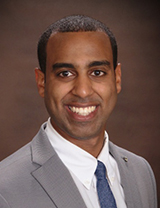 I am pleased to announce Paulos Mengsteab, a graduate student in the Institute for Regenerative Engineering, has received funding from a NIH/NIAMS supplemental grant which will support his Ph.D. studies. This supplemental grant to our current NIH R01 grant, “A Translational Approach to Ligament Regeneration,” evaluates the efficacy of surface modulation of a previously established 3D braided biomimetic tissue-engineered scaffold.
I am pleased to announce Paulos Mengsteab, a graduate student in the Institute for Regenerative Engineering, has received funding from a NIH/NIAMS supplemental grant which will support his Ph.D. studies. This supplemental grant to our current NIH R01 grant, “A Translational Approach to Ligament Regeneration,” evaluates the efficacy of surface modulation of a previously established 3D braided biomimetic tissue-engineered scaffold.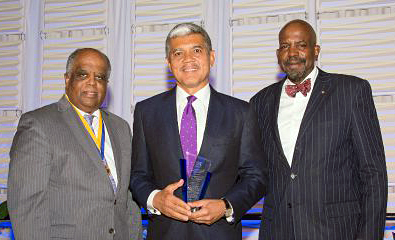 I am pleased to announce M. Roy Wilson, president of Wayne State University, is the recipient of the 2015 Cato T. Laurencin, M.D., Ph.D., Lifetime Research Award. Dr. Wilson received his M.D. degree from Harvard Medical School and his Master of Science in epidemiology at the UCLA School of Public Health. Dr. Wilson is an accomplished researcher focused on glaucoma and blindness in West Africa, the Caribbean, and urban communities in the United States. He is an elected member of the National Academy of Medicine, the American Ophthalmological Society, and the Glaucoma Research Society.
I am pleased to announce M. Roy Wilson, president of Wayne State University, is the recipient of the 2015 Cato T. Laurencin, M.D., Ph.D., Lifetime Research Award. Dr. Wilson received his M.D. degree from Harvard Medical School and his Master of Science in epidemiology at the UCLA School of Public Health. Dr. Wilson is an accomplished researcher focused on glaucoma and blindness in West Africa, the Caribbean, and urban communities in the United States. He is an elected member of the National Academy of Medicine, the American Ophthalmological Society, and the Glaucoma Research Society.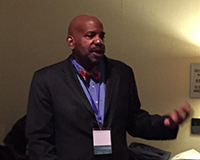 I am happy to announce that Springer Publishing has officially launched the international journal, Regenerative Engineering and Translational Medicine in partnership with the newly formed Regenerative Engineering Society. The new journal will cover the convergence of multiple fields including tissue generation, advanced materials science, stem cell research, the physical sciences, and developmental biology. The senior editorial team includes managing editor, Lakshmi S. Nair, MPhil, PhD, and assistant managing editor, Tao Jiang, PhD, MBA, both of the University of Connecticut; and news and views editor, Ali Khademhosseini, PhD, of Harvard University. Regenerative Engineering and Translational Medicine is currently seeking submissions. For information and online submission instructions, please visit the
I am happy to announce that Springer Publishing has officially launched the international journal, Regenerative Engineering and Translational Medicine in partnership with the newly formed Regenerative Engineering Society. The new journal will cover the convergence of multiple fields including tissue generation, advanced materials science, stem cell research, the physical sciences, and developmental biology. The senior editorial team includes managing editor, Lakshmi S. Nair, MPhil, PhD, and assistant managing editor, Tao Jiang, PhD, MBA, both of the University of Connecticut; and news and views editor, Ali Khademhosseini, PhD, of Harvard University. Regenerative Engineering and Translational Medicine is currently seeking submissions. For information and online submission instructions, please visit the 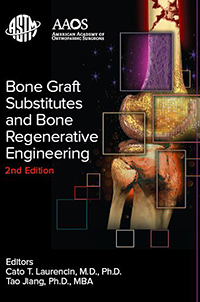 The Institute for Regenerative Engineering has published the landmark book Bone Graft Substitutes and Bone Regenerative Engineering. The book provides a well-rounded and articulate summary of the present status of using allogeneic, xenogenic, and synthetic bone graft substitutes to reconstruct bone tissues. To reflect on the importance of the concept of convergence, Bone Graft Substitutes and Bone Regenerative Engineering captures the excitement of the new field we call Regenerative Engineering. The chapters of the book are written by the leading researchers in academia, surgeons, industry leaders and regulatory specialists. We believe this new book, following the very successful first edition entitled Bone Graft Substitutes, will be of value to people who work in all fields involving bone. I thank Dr. Tao Jiang, my co-editor, for his time and effort in working with me. In addition, the publication of this book would be impossible without the assistance from numerous people at ASTM International. Finally, I also want to thank the Raymond and Beverly Sackler Foundation for their tremendous support in all our efforts to define the new field of Regenerative Engineering.
The Institute for Regenerative Engineering has published the landmark book Bone Graft Substitutes and Bone Regenerative Engineering. The book provides a well-rounded and articulate summary of the present status of using allogeneic, xenogenic, and synthetic bone graft substitutes to reconstruct bone tissues. To reflect on the importance of the concept of convergence, Bone Graft Substitutes and Bone Regenerative Engineering captures the excitement of the new field we call Regenerative Engineering. The chapters of the book are written by the leading researchers in academia, surgeons, industry leaders and regulatory specialists. We believe this new book, following the very successful first edition entitled Bone Graft Substitutes, will be of value to people who work in all fields involving bone. I thank Dr. Tao Jiang, my co-editor, for his time and effort in working with me. In addition, the publication of this book would be impossible without the assistance from numerous people at ASTM International. Finally, I also want to thank the Raymond and Beverly Sackler Foundation for their tremendous support in all our efforts to define the new field of Regenerative Engineering.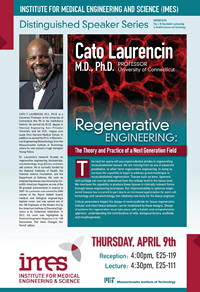 On April 9, I gave a plenary lecture as part of the Institute for Medical Engineering & Science (IMES) Distinguished Speaker Series at MIT. My talk highlighted the importance of convergence research as illustrated by some of our recent work in the Institute for Regenerative Engineering.
On April 9, I gave a plenary lecture as part of the Institute for Medical Engineering & Science (IMES) Distinguished Speaker Series at MIT. My talk highlighted the importance of convergence research as illustrated by some of our recent work in the Institute for Regenerative Engineering.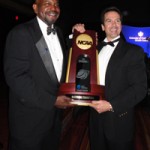 On February 7th and 8th, I participated in the 2015 Musculoskeletal Development and Regeneration Conference in Cancun, Mexico. My speech, “Regenerative Engineering: The Theory and Practice of a Next Generation Field,” highlighted the future of regenerative engineering in musculoskeletal repair and regeneration. I discussed the challenge of musculoskeletal tissue engineering and several of the latest inventions developed by the Institute for Regenerative Engineering here at UConn Health including a bioengineered matrix for the regeneration of torn anterior cruciate ligaments. I want to thank the organizers for including me as part of this for those working on the frontiers of science in both academia and corporate industry.
On February 7th and 8th, I participated in the 2015 Musculoskeletal Development and Regeneration Conference in Cancun, Mexico. My speech, “Regenerative Engineering: The Theory and Practice of a Next Generation Field,” highlighted the future of regenerative engineering in musculoskeletal repair and regeneration. I discussed the challenge of musculoskeletal tissue engineering and several of the latest inventions developed by the Institute for Regenerative Engineering here at UConn Health including a bioengineered matrix for the regeneration of torn anterior cruciate ligaments. I want to thank the organizers for including me as part of this for those working on the frontiers of science in both academia and corporate industry.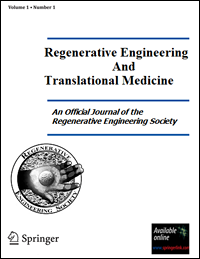 I am very happy to announce the launch of a new journal entitled Regenerative Engineering and Translational Medicine. It will be published quarterly beginning in later 2015.
I am very happy to announce the launch of a new journal entitled Regenerative Engineering and Translational Medicine. It will be published quarterly beginning in later 2015.